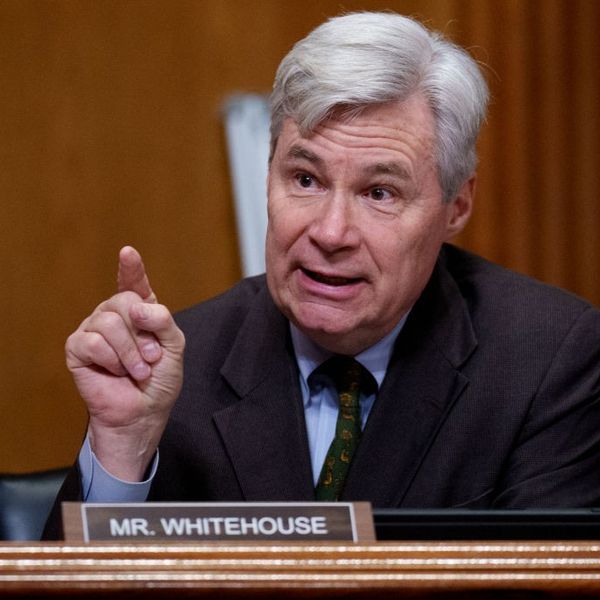From DOE to CEO: Revolving Door Spins in Washington as Top Official Hired by Nuclear Company
Watchdogs raise ethics concerns as Dan Poneman takes helm of company that benefited significantly from lucrative government deals on his watch
Government watchdogs are raising ethics concerns that Dan Poneman, who served for years as a high-ranking Department of Energy official, has just taken a job as president and CEO of a nuclear enrichment company that has long received special treatment from the federal government, including on his watch.
During his tenure as Deputy Secretary of Energy from 2009 to 2014 (including a brief stint as Acting Energy Secretary), Poneman was a strong advocate of nuclear power, touting it as a reliable energy source and a possible solution to the climate crisis.
Also during Poneman's reign, Centrus Energy Corp., known formerly as U.S. Enrichment Corp., was a major beneficiary of federal deals.
In fact, the DOE was accused (pdf) by the Government Accountability Office of breaking laws by conducting four uranium transfers in 2012 and 2013 to favor the company, which enriches uranium for the U.S. military and the nuclear industry.
However, this censure did not stop Washington's revolving doors from spinning.
Centrus Energy Corp. announced that Poneman "has been selected by its Board of Directors as president and chief executive officer of the Company." The gig pays up to $1.7 million a year, according to Politico reporter Darius Dixon.
But even while ethics rules will prohibit Poneman from contacting the DOE directly for two years, watchdogs say the shuffle still stinks.
Tyson Slocum, director of the energy program for the consumer advocacy group Public Citizen, told Environment & Energy Publishing that this is one of the most dramatic examples of Washington's revolving door he's ever seen.
"This doesn't really pass the smell test," he said. "You're putting a top former government official in charge of the company; it's safe to say his appointment as CEO is all about maximizing their influence with key federal officials for all types of federal support."
Ed Lyman, a senior scientist with the Union of Concerned Scientists, told Politico he agrees. "The lobbying aside, it's really just the appearance that this job was some sort of reward for the favorable treatment they were getting from DOE. It's just that appearance that needs to be respected."
An Urgent Message From Our Co-Founder
Dear Common Dreams reader, The U.S. is on a fast track to authoritarianism like nothing I've ever seen. Meanwhile, corporate news outlets are utterly capitulating to Trump, twisting their coverage to avoid drawing his ire while lining up to stuff cash in his pockets. That's why I believe that Common Dreams is doing the best and most consequential reporting that we've ever done. Our small but mighty team is a progressive reporting powerhouse, covering the news every day that the corporate media never will. Our mission has always been simple: To inform. To inspire. And to ignite change for the common good. Now here's the key piece that I want all our readers to understand: None of this would be possible without your financial support. That's not just some fundraising cliche. It's the absolute and literal truth. We don't accept corporate advertising and never will. We don't have a paywall because we don't think people should be blocked from critical news based on their ability to pay. Everything we do is funded by the donations of readers like you. Will you donate now to help power the nonprofit, independent reporting of Common Dreams? Thank you for being a vital member of our community. Together, we can keep independent journalism alive when it’s needed most. - Craig Brown, Co-founder |
Government watchdogs are raising ethics concerns that Dan Poneman, who served for years as a high-ranking Department of Energy official, has just taken a job as president and CEO of a nuclear enrichment company that has long received special treatment from the federal government, including on his watch.
During his tenure as Deputy Secretary of Energy from 2009 to 2014 (including a brief stint as Acting Energy Secretary), Poneman was a strong advocate of nuclear power, touting it as a reliable energy source and a possible solution to the climate crisis.
Also during Poneman's reign, Centrus Energy Corp., known formerly as U.S. Enrichment Corp., was a major beneficiary of federal deals.
In fact, the DOE was accused (pdf) by the Government Accountability Office of breaking laws by conducting four uranium transfers in 2012 and 2013 to favor the company, which enriches uranium for the U.S. military and the nuclear industry.
However, this censure did not stop Washington's revolving doors from spinning.
Centrus Energy Corp. announced that Poneman "has been selected by its Board of Directors as president and chief executive officer of the Company." The gig pays up to $1.7 million a year, according to Politico reporter Darius Dixon.
But even while ethics rules will prohibit Poneman from contacting the DOE directly for two years, watchdogs say the shuffle still stinks.
Tyson Slocum, director of the energy program for the consumer advocacy group Public Citizen, told Environment & Energy Publishing that this is one of the most dramatic examples of Washington's revolving door he's ever seen.
"This doesn't really pass the smell test," he said. "You're putting a top former government official in charge of the company; it's safe to say his appointment as CEO is all about maximizing their influence with key federal officials for all types of federal support."
Ed Lyman, a senior scientist with the Union of Concerned Scientists, told Politico he agrees. "The lobbying aside, it's really just the appearance that this job was some sort of reward for the favorable treatment they were getting from DOE. It's just that appearance that needs to be respected."
Government watchdogs are raising ethics concerns that Dan Poneman, who served for years as a high-ranking Department of Energy official, has just taken a job as president and CEO of a nuclear enrichment company that has long received special treatment from the federal government, including on his watch.
During his tenure as Deputy Secretary of Energy from 2009 to 2014 (including a brief stint as Acting Energy Secretary), Poneman was a strong advocate of nuclear power, touting it as a reliable energy source and a possible solution to the climate crisis.
Also during Poneman's reign, Centrus Energy Corp., known formerly as U.S. Enrichment Corp., was a major beneficiary of federal deals.
In fact, the DOE was accused (pdf) by the Government Accountability Office of breaking laws by conducting four uranium transfers in 2012 and 2013 to favor the company, which enriches uranium for the U.S. military and the nuclear industry.
However, this censure did not stop Washington's revolving doors from spinning.
Centrus Energy Corp. announced that Poneman "has been selected by its Board of Directors as president and chief executive officer of the Company." The gig pays up to $1.7 million a year, according to Politico reporter Darius Dixon.
But even while ethics rules will prohibit Poneman from contacting the DOE directly for two years, watchdogs say the shuffle still stinks.
Tyson Slocum, director of the energy program for the consumer advocacy group Public Citizen, told Environment & Energy Publishing that this is one of the most dramatic examples of Washington's revolving door he's ever seen.
"This doesn't really pass the smell test," he said. "You're putting a top former government official in charge of the company; it's safe to say his appointment as CEO is all about maximizing their influence with key federal officials for all types of federal support."
Ed Lyman, a senior scientist with the Union of Concerned Scientists, told Politico he agrees. "The lobbying aside, it's really just the appearance that this job was some sort of reward for the favorable treatment they were getting from DOE. It's just that appearance that needs to be respected."

